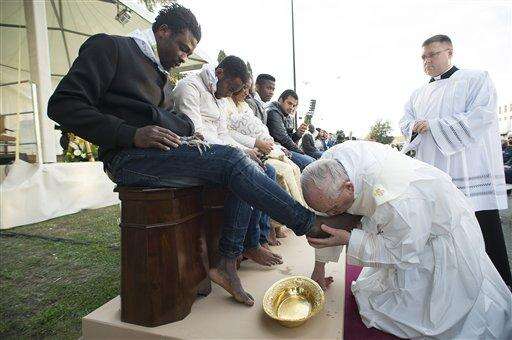
Pope Francis did not radically reform the church the way that Pope John Paul did several decades ago. But in his own way he was just as revolutionary.
He stayed within the structural and doctrinal limits of his tradition, not upsetting any institutional applecarts. But he did surprise some, delight many, and disturb quite a few traditionalists by being… well, nice.
Every religious tradition has a hard side and a soft one. The hard side is about rules and doctrines. Think of the catechism of the Roman Catholic church, the Sharia laws of Islam, the Rahit Nama of the Sikh tradition. These can be simply good guidelines for righteous living, a nice set of standards in the background of daily life. Or they can come forward and dominate attitudes. They can be rigorously enforced, sometimes severely so.
There is also a soft side, a kindler, gentler side to religion. This is the admonition to “love your neighbor as yourself,” to “welcome the stranger for you once were a stranger as well.” It is the call for mercy and justice and inclusion that Bishop Budde spoke about in preaching to President Trump in the National Cathedral during his inauguration. This is the side of faith that Pope Francis exhibited in spades.
His kindness was especially apparent in his approach to other religious traditions, to refugees and prisoners, to marginalized people and the LGBTQ community. They were all God’s children, in the Pope’s view. And for that he had the Biblical teachings as his authority.
He traveled the world and was greeted by throngs that included not just his Roman Catholic followers, but also people of various faiths or no faith at all. They wanted to see and be in the presence of this great human spirit.
It is true that he met with US Vice President J. D. Vance the day before he died. But he had remarks prepared that were delivered to Vance on that occasion, excoriating the Trump administration for their approach to cruelly capturing refugees and forcing them back to their lethal homelands, or sending them to a foreign prison with no ability to challenge the conviction and no hope of returning.
Three days before he died, the Pope was in prison. Not as a prisoner, of course, but to perform a remarkable act of humility and service.
There is a practice of Popes during Holy Week, the week before Easter, to wash other people’s feet, just as Jesus had. It is a sign of humility and service that says more in its simple actions than words could ever say. Often the Popes would wash the feet of Nuns and Priests and other faithful Catholics.
Not Pope Francis. He also washed feet during Holy Week, and in his last hours he went to a prison to wash the feet of the inmates, regardless of what crime had sent them there.
He also went to refugee camps on the same mission. He washed the feet of African and Middle Eastern refugees, many of them Muslims who probably wondered who this strange white-robed elderly White man was, and why he was bending down to wash and kiss their feet.
But the world knew. He was a Pope not just for the baptized few, but for all humanity. We are all better for his example.
